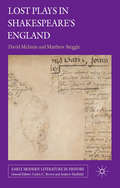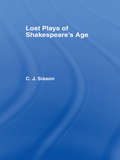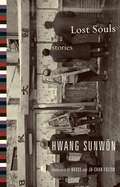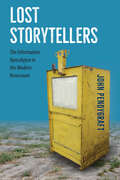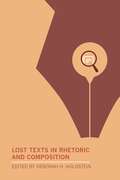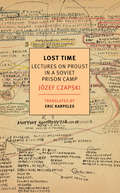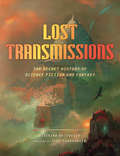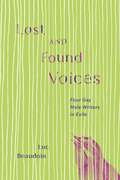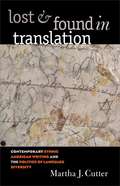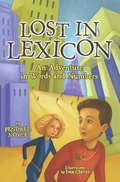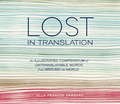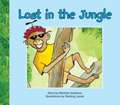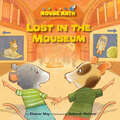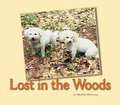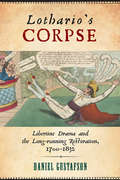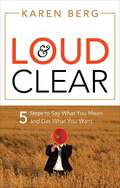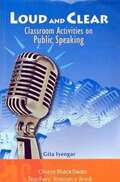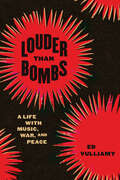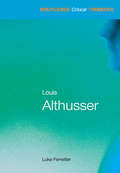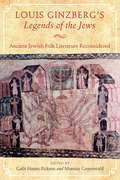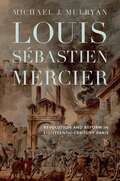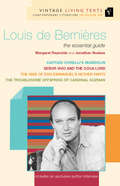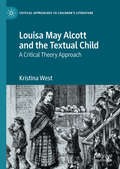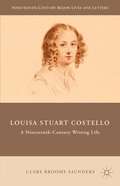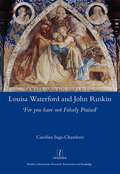- Table View
- List View
Lost Plays in Shakespeare’s England
by David Mcinnis Matthew SteggleLost Plays in Shakespeare's England examines assumptions about what a lost play is and how it can be talked about; how lost plays can be reconstructed, particularly when they use narratives already familiar to playgoers; and how lost plays can force us to reassess extant plays, particularly through ideas of repertory studies.
Lost Plays of Shakespeare S a Cb: Lost Plays Shakespeare
by Charles Jasper SissonFirst published in 1971
Lost Souls: Stories (Weatherhead Books on Asia)
by Sunwon HwangThese captivating short stories portray three major periods in modern Korean history: the forces of colonial modernity during the late 1930s; the postcolonial struggle to rebuild society after four decades of oppression, emasculation, and cultural exile (1945 to 1950); and the attempt to reconstruct a shattered land and a traumatized nation after the Korean War.Lost Souls echoes the exceptional work of China's Shen Congwen and Japan's Kawabata Yasunari. Modernist narratives set in the metropolises of Tokyo and Pyongyang alternate with starkly realistic portraits of rural life. Surrealist tales suggest the unsettling sensation of colonial domination, while stories of the outcast embody the thrill and terror of independence and survival in a land dominated by tradition and devastated by war. Written during the chaos of 1945, "Booze" recounts a fight between Koreans for control of a former Japanese-owned distillery. "Toad" relates the suffering created by hundreds of thousands of returning refugees, and stories from the 1950s confront the catastrophes of the Korean War and the problematic desire for autonomy. Visceral and versatile, Lost Souls is a classic work on the possibilities of transition that showcases the innovation and craftsmanship of a consummate-and widely celebrated-storyteller.
Lost Storytellers: The Information Apocalypse in the Modern Newsroom
by John PendygraftCommunity journalism in the era of clickbait An incisive and firsthand look at the landscape of community news today, Lost Storytellers argues that the decline of local journalism threatens the future of democracy. Award-winning photojournalist John Pendygraft asks: How did Americans lose trust in the media, and how can their local newsrooms earn it back? Pendygraft uses his own experiences at Florida’s largest newspaper, the Tampa Bay Times, to illustrate why trusted local reporting matters more than ever in the era of “fake news,” clickbait, conspiracy theories, and social media. Through interviews with his colleagues, the history of his own paper, journeys into the evolutionary psychology of storytelling, and examples of the ways multinational media conglomerates hook readers on news cycles of chaos and crisis, Pendygraft argues that community journalists can reclaim their roles as local storytellers—and that the public good demands that they try. Lost Storytellers offers insights for all who feel confused about the media, politics, and the well-being of their communities in the information age.
Lost Texts in Rhetoric and Composition
by Deborah H. HoldsteinA project of recovery and reanimation, Lost Texts in Rhetoric and Composition foregrounds a broad range of publications that deserve renewed attention. Contributors to this volume reclaim these lost texts to reenvision the rhetorical tradition itself. Authors discussed include not only twentieth-century American compositionists but also a linguist, a poet, a philosopher, a painter, a Renaissance rhetorician, and a nineteenth-century pioneer of comics; the collection also features some less-studied works by authors who remain well known. These texts will give rise to new conversations about current ideas in rhetoric and composition.This volume contains discussion of the following authors and titles: Judah Messer Leon, The Book of the Honeycomb's Flow, Angel DeCora, Sterling Andrus Leonard, English Composition as a Social Problem, Rodolphe Töpffer, William James, Kenneth Burke, Adrienne Rich, Ann E. Berthoff, John Mohawk, "Western Peoples, Natural Peoples," William Vande Kopple, William Irmscher, Beat Not the Poor Desk, Walter J. Ong, Geneva Smitherman, Thomas Zebroski, Linda Brodkey, Craig S. Womack, Deborah Cameron, James Slevin, Marilyn Sternglass, and William E. Coles, Jr.
Lost Time: Lectures on Proust in a Soviet Prison Camp
by Jozef Czapski Eric KarpelesThe first translation of painter and writer Józef Czapski's inspiring lectures on Proust, first delivered in a prison camp in the Soviet Union during World War II.During the Second World War, as a prisoner of war in a Soviet camp, and with nothing but memory to go on, the Polish artist and soldier Józef Czapski brought Marcel Proust’s In Search of Lost Time to life for an audience of prison inmates. In a series of lectures, Czapski described the arc and import of Proust’s masterpiece, sketched major and minor characters in striking detail, and movingly evoked the work’s originality, depth, and beauty. Eric Karpeles has translated this brilliant and altogether unparalleled feat of the critical imagination into English for the first time, and in a thoughtful introduction he brings out how, in reckoning with Proust’s great meditation on memory, Czapski helped his fellow officers to remember that there was a world apart from the world of the camp. Proust had staked the art of the novelist against the losses of a lifetime and the imminence of death. Recalling that triumphant wager, unfolding, like Sheherazade, the intricacies of Proust’s world night after night, Czapski showed to men at the end of their tether that the past remained present and there was a future in which to hope.
Lost Transmissions: The Secret History of Science Fiction and Fantasy
by Desirina BoskovichThis illustrated journey through lost, overlooked, and uncompleted works is &“a fascinating enrichment of the history of sf and fantasy&” (Booklist). Science fiction and fantasy reign over popular culture now, associated in our mind with blockbuster movies and massive conventions. But there&’s much more to the story than the headline-making hits. Lost Transmissions is a rich trove of forgotten and unknown, imagined-but-never-finished, and under-appreciated-but-influential works from those imaginative genres, as well as little-known information about well-known properties. Divided into sections on Film & TV, Literature, Art, Music, Fashion, Architecture, and Pop Culture, the book examines: Jules Verne&’s lost novelAfroFuturism and Space DiscoE.T.&’s scary beginningsWilliam Gibson&’s never-filmed Aliens sequelWeezer&’s never-made space operathe 8,000-page metaphysical diary of Philip K. Dick, and more Featuring more than 150 photos, this insightful volume will become the bible of science fiction and fantasy&’s most interesting and least-known chapters. &“Will broaden your horizons and turn you on to wonders bubbling under the mass-market commodified pleasures to which we all too often limit ourselves.&” —The Washington Post
Lost and Found Voices: Four Gay Male Writers in Exile
by Luc BeaudoinOne writer is stranded by the Second World War. Another flees multiple revolutions to live the rest of his life in Rio de Janeiro. Two others, public about their sexuality at home, choose self-exile. In Lost and Found Voices Luc Beaudoin offers a critical engagement with these four displaced authors: Witold Gombrowicz, Valerii Pereleshin, Abdellah Taïa, and Slava Mogutin.Not quite fitting into their respective diasporas and sharing an urge to express their queer desires, it is in their published works of literature, film, and photography that these writers locate their shifting identities and emergent queer voices. Their artistry is the basis from which Beaudoin traces their expressions of desire in language, culture, and community, offering a contextual queer reading that navigates their linguistic, cultural, artistic, and sexual self-translations and self-portrayals. Their choices are determinative: Gombrowicz masked his attraction to men in his works, keeping the truth hidden in an intimate diary; Pereleshin explored his lust in Brazilian Portuguese after being shunned by the Russian diaspora; Taïa writes in French to destabilize both the language and his status as an immigrant in France; Mogutin becomes a hardcore gay rebel in word and image to rattle assumptions about gay life.Bringing authors generally not familiar to an English-speaking readership into one volume, and including Beaudoin's own experience of living between languages, Lost and Found Voices provides provocative insights into what it means to be gay in both the past and the present.
Lost and Found in Translation
by Martha J. CutterStarting with Salman Rushdie's assertion that even though something is always lost in translation, something can always be gained, Martha Cutter examines the trope of translation in twenty English-language novels and autobiographies by contemporary ethnic American writers. She argues that these works advocate a politics of language diversity--a literary and social agenda that validates the multiplicity of ethnic cultures and tongues in the United States.Cutter studies works by Asian American, Native American, African American, and Mexican American authors. She argues that translation between cultures, languages, and dialects creates a new language that, in its diversity, constitutes the true heritage of the United States. Through the metaphor of translation, Cutter demonstrates, writers such as Maxine Hong Kingston, Sherman Alexie, Toni Morrison, and Richard Rodriguez establish a place within American society for the many languages spoken by multiethnic and multicultural individuals. Cutter concludes with an analysis of contemporary debates over language policy, such as English-only legislation, the recognition of Ebonics, and the growing acceptance of bilingualism. The focus on translation by so many multiethnic writers, she contends, offers hope in our postmodern culture for a new condition in which creatively fused languages renovate the communications of the dominant society and create new kinds of identity for multicultural individuals.
Lost in Lexicon
by Joan Charles Pendred Noyce"If this is an adventure, we should just plunge in..."When thirteen-year-old cousins Ivan and Daphne go on a treasure hunt in the rain one summer day, they never expect to stumble into a whole new world where words and numbers run wild.After the cousins outwit a plague of punctuation, grateful villagers beg them to find Lexicon's missing children, who have been enticed away by dancing lights in the sky. Trekking between villages in search of clues, the cousins encounter a talking thesaurus, a fog of forgetting, the Mistress of Metaphor, a panel of poets, feuding parts of speech, and the illogical mathematicians of Irrationality. When a careless Mathemystical reflects them across the border into the ominous Land of Night, their peril deepens. Kidnapped, imprisoned, and mesmerized-with time running out-will Ivan and Daphne find a way to solve the mystery of the lights in the sky and restore the lost children of Lexicon to their homes?Lost in Lexicon will whisk children away into an interactive and magical world of learning.
Lost in Translation
by Ella Frances SandersAn artistic collection of more than 50 drawings featuring unique, funny, and poignant foreign words that have no direct translation into English. Did you know that the Japanese language has a word to express the way sunlight filters through the leaves of trees? Or that there's a Finnish word for the distance a reindeer can travel before needing to rest? Lost in Translation brings to life more than fifty words that don't have direct English translations with charming illustrations of their tender, poignant, and humorous definitions. Often these words provide insight into the cultures they come from, such as the Brazilian Portuguese word for running your fingers through a lover's hair, the Italian word for being moved to tears by a story, or the Swedish word for a third cup of coffee. In this clever and beautifully rendered exploration of the subtleties of communication, you'll find new ways to express yourself while getting lost in the artistry of imperfect translation.From the Hardcover edition..From the Hardcover edition.
Lost in the Mouseum: Left/right (Mouse Math)
by Eleanor MayEach read-aloud book in the Mouse Math series focuses on a single, basic math concept and features adorable mice, Albert and Wanda, who live in a People House. Entertaining fiction stories capture kids&’ imaginations as the mice learn about numbers, shapes, sizes and more. Over 3 million copies sold worldwide!Mouse mummies, fossil-digging, and more! Albert is excited to explore the mouseum. But when his friend Leo's little cousin goes missing, tracking her down takes the mice on a whole new adventure. Every Mouse Math title includes back matter activities that support and extend reading comprehension and math skills, plus free online activities. (Math concept: Left/Right)
Lost in the Woods
by Michèle DufresneRosie, the nervous and worried dog, thinks she and Bella are lost in the woods.
Lothario's Corpse: Libertine Drama and the Long-Running Restoration, 1700-1832 (Transits: Literature, Thought & Culture 1650-1850)
by Daniel GustafsonLothario’s Corpse unearths a performance history, on and off the stage, of Restoration libertine drama in Britain’s eighteenth and early nineteenth centuries. While standard theater histories emphasize libertine drama’s gradual disappearance from the nation’s acting repertory following the dispersal of Stuart rule in 1688, Daniel Gustafson traces its persistent appeal for writers and performers wrestling with the powers of the emergent liberal subject and the tensions of that subject with sovereign absolutism. With its radical, absolutist characters and its scenarios of aristocratic license, Restoration libertine drama became a critical force with which to engage in debates about the liberty-loving British subject’s relation to key forms of liberal power and about the troubling allure of lawless sovereign power that lingers at the heart of the liberal imagination. Weaving together readings of a set of literary texts, theater anecdotes, political writings, and performances, Gustafson illustrates how the corpse of the Restoration stage libertine is revived in the period’s debates about liberty, sovereign desire, and the subject’s relation to modern forms of social control. Ultimately, Lothario’s Corpse suggests the “long-running” nature of Restoration theatrical culture, its revived and revised performances vital to what makes post-1688 Britain modern. Published by Bucknell University Press. Distributed worldwide by Rutgers University Press.
Loud & Clear: 5 Steps to Say What You Mean and Get What You Want
by Karen BergHow to be heard through the noise: “A must read for today’s busy, 24/7 professional who needs to communicate both thoughtfully and instantaneously.” —Mark Herman, EVP, Booz Allen HamiltonLoud & Clear is an essential guide to the effective communication skills that help you get what you want. Whoever you need to get a message through to—an employer, team, committee, staffer, neighbor, teacher, student, or spouse—this book will show you how to get their attention by:• Using your head. Before you even think about opening your mouth, you need to think long and hard about the person you want to influence and how to say what you want.• Connecting with your listener(s). How to establish chemistry and intimacy with your listeners—from an individual to a stadium-sized audience—to make them want to listen to you.• Keeping their interest. Why “soft” communication, such as storytelling and picture-painting, are important devices, and how to use them effectively. Plus, how to avoid the dreaded “drone factor.”• Saying it right. Speech and body language techniques make a lasting impression.• Anticipating and overcoming the negatives. How to recognize disaster before it strikes, and handle it when it does.Each chapter also features a topic-specific “plan of attack,” plus client stories, checklists, worksheets, and quizzes. It can be hard to get through in today’s noisy world—but for those trying to get a raise, motivate a team, organize a group, or just get better customer service, these proven methods help you say what you mean to get what you want.
Loud and Clear: Classroom Activities on Public Speaking
by Gita IyengarLoud and Clear: Classroom Activities on Public Speaking is resource book for teachers. It aims to cultivate the art of effective communication by making use of well known activities such as elocution, extempore, debates, quizzes and group discussions.
Louder Than Bombs: A Life with Music, War, and Peace
by Ed VulliamyPart memoir, part reportage, Louder Than Bombs is a story of music from the front lines. Ed Vulliamy, a decorated war correspondent and journalist, offers a testimony of his lifelong passion for music. Vulliamy’s reporting has taken him around the world to cover the Bosnian war, the fall of the Berlin Wall and collapse of Communism, the Iraq wars of 1991 and 2003 onward, narco violence in Mexico, and more, places where he confronted stories of violence, suffering, and injustice. Through it all, Vulliamy has turned to music not only as a reprieve but also as a means to understand and express the complicated emotions that follow. Describing the artists, songs, and concerts that most influenced him, Vulliamy brings together the two largest threads of his life—music and war. Louder Than Bombs covers some of the most important musical milestones of the past fifty years, from Jimi Hendrix playing “Machine Gun” at the Isle of Wight Festival in 1970 to the Bataclan in Paris under siege in 2015. Vulliamy was present for many of these historic moments, and with him as our guide, we see them afresh, along the way meeting musicians like B. B. King, Graham Nash, Patti Smith, Daniel Barenboim, Gustavo Dudamel, and Bob Dylan. Vulliamy peppers the book with short vignettes—which he dubs 7" singles—recounting some of his happiest memories from a lifetime with music. Whether he’s working as an extra in the Vienna State Opera’s production of Aida, buying blues records in Chicago, or drinking coffee with Joan Baez, music is never far from his mind. As Vulliamy discovers, when horror is unspeakable, when words seem to fail us, we can turn to music for expression and comfort, or for rage and pain. Poignant and sensitively told, Louder Than Bombs is an unforgettable record of a life bursting with music.
Louis Althusser (Routledge Critical Thinkers)
by Luke FerretterBest known for his theories of ideology and its impact on politics and culture, Louis Althusser revolutionized Marxist theory. His writing changed the face of literary and cultural studies, and continues to influence political modes of criticism such as feminism, postcolonialism and queer theory. Beginning with an introduction to the context of Marxist theory, this book goes on to explain: * how Althusser interpreted and developed Marx’s work * the political implications of reading * ideology and its significance for culture and criticism * Althusser’s aesthetic criticism of literature, theatre and art. Placing Althusser’s key ideas in the context of earlier Marxist thought, as well as tracing their development and impact, Luke Ferretter presents a wide-ranging yet accessible guide, ideal for those new to the work of this influential critical thinker.
Louis Ginzberg's Legends of the Jews: Ancient Jewish Folk Literature Reconsidered (Raphael Patai Series in Jewish Folklore and Anthropology)
by Galit Hasan-Rokem Ithamar GruenwaldAt the beginning of the twentieth century, many perceived American Jewry to be in a state of crisis as traditions of faith faced modern sensibilities. Published beginning in 1909, Rabbi and Professor Louis Ginzberg's seven-volume The Legends of the Jews appeared at this crucial time and offered a landmark synthesis of aggadah from classical Rabbinic literature and ancient folk legends from a number of cultures. It remains a hugely influential work of scholarship from a man who shaped American Conservative Judaism. In Louis Ginzberg's Legends of the Jews: Ancient Jewish Folk Literature Reconsidered, editors Galit Hasan-Rokem and Ithamar Gruenwald present a range of reflections on the Legends, inspired by two plenary sessions devoted to its centennial at the Fifteenth Congress of the World Association of Jewish Studies in August 2009. In order to provide readers with the broadest possible view of Ginzberg's colossal project and its repercussions in contemporary scholarship, the editors gathered leading scholars to address it from a variety of historical, philological, philosophical, and methodological perspectives. Contributors give special regard to the academic expertise and professional identity of the author of the Legends as a folklore scholar and include discussions on the folkloristic underpinnings of The Legends of the Jews. They also investigate, each according to her or his disciplinary framework, the uniqueness, strengths, and weakness of the project. An introduction by Rebecca Schorsch and a preface by Galit Hasan-Rokem further highlight the folk narrative aspects of the work in addition to the articles themselves. The present volume makes clear the historical and scholarly context of Ginzberg's milestone work as well as the methodological and theoretical issues that emerge from studying it and other forms of aggadic literature. Scholars of Jewish folklore as well as of Talmudic-Midrashic literature will find this volume to be invaluable reading.
Louis Sébastien Mercier: Revolution and Reform in Eighteenth-Century Paris (Transits: Literature, Thought & Culture, 1650-1850)
by Michael J. MulryanFrench playwright, novelist, activist, and journalist Louis Sébastien Mercier (1740–1814) passionately captured scenes of social injustice in pre-Revolutionary Paris in his prolific oeuvre but today remains an understudied writer. In this penetrating study—the first in English devoted to Mercier in decades—Michael Mulryan explores his unpublished writings and urban chronicles, Tableau de Paris (1781–88) and Le Nouveau Paris (1798), in which he identified the city as a microcosm of national societal problems, detailed the conditions of the laboring poor, encouraged educational reform, and confronted universal social ills. Mercier’s rich writings speak powerfully to the sociopolitical problems that continue to afflict us as political leaders manipulate public debate and encourage absolutist thinking, deepening social divides. An outcast for his polemical views during his lifetime, Mercier has been called the founder of modern urban discourse, and his work a precursor to investigative journalism. This sensitive study returns him to his rightful place among Enlightenment thinkers.
Louis de Bernières: The Essential Guide (Vintage Living Texts #7)
by Margaret Reynolds Jonathan NoakesIn Vintage Living Texts teachers and students will find the essential guide to the works of Louis de Bernières. Vintage Living Texts is unique in that it offers an in-depth interview with Louis de Bernières, relating specifically to the texts under discussion.This guide will deal with de Bernières' themes, genre and narrative technique, and a close reading of the texts will be accompanied with likely exam questions, and contexts and comparisons - as well as providing a rich source of ideas for intelligent and inventive ways of approaching the novels.Also included in this guide are detailed reading plans for all four novels, questions for essays and discussion, contextual material, suggested texts for complimentary and comparative reading, extracts from reviews, a biography, a bibliography and a glossary of literary terms.
Louisa May Alcott and the Textual Child: A Critical Theory Approach (Critical Approaches to Children's Literature)
by Kristina WestThis book examines constructions of childhood in the works of Louisa May Alcott. While Little Women continues to gain popular and critical attention, Alcott’s wider works for children have largely been consigned to history. This book therefore investigates Alcott’s lesser-known children’s texts to reconsider critical assumptions about childhood in her works and in literature more widely. Kristina West investigates the trend towards reading Alcott’s life into her works; readings of gender and sexuality, race, disability, and class; the sentimental domestic; portrayals of Transcendentalism and American education; and adaptations of these works. Analyzing Alcott as a writer for twenty-first-century children, West considers Alcott’s place in the children’s canon and how new media and fan fiction impact readings of her works today.
Louisa Stuart Costello
by Clare Broome SaundersLouisa Stuart Costello (1799-1870) was a popular and critically acclaimed poet, novelist, travel writer, historian, biographer, artist, and medieval scholar, whose long life spanned the nineteenth century. Her wide ranging choice of genre demonstrates her skill as a writer and artist, and her acute understanding of contemporary reading trends and publishing markets. Exploring how Costello writes, what she writes, and when she writes it, provides a rich source of information about literary history, and the career of a professional woman writer in the nineteenth century. Louisa Stuart Costello: A Nineteenth-century Writing Life provides a wealth of extracts from her diverse writings, with reader responses from critics and peers, examples of her illustrations, and literary and historical contexts.
Louisa Waterford and John Ruskin: 'For You Have Not Falsely Praised'
by Caroline Ings-ChambersLouisa Waterford (1818-91), modest, retiring, of good family, renowned for her beauty, and with extraordinary grace, was the embodiment of a Victorian ideal of womanhood. But like the age itself, her life was filled with contrasts and paradoxes. She had been born with artistic gifts, and became a satellite of the Pre-Raphaelite Brotherhood, though she had no formal training. Then, at the height of John Ruskin's intellectual power and success as a critic, she asked him to accept her as an art student, and he accepted. Their correspondence- often harshly critical, never, as Waterford put it, falsely praising - lies at the heart of this book. These are letters which open a spectrum of discussion on the cultural, gender and social issues of the period. Both Waterford and Ruskin engaged in tireless philanthropic work for diverse causes, crossing social boundaries with subtle determination, and both responded to a sense of duty as well as an artistic vocation. But, as Ings-Chambers shows, their correspondence was more than a dialogue about society: it helped to make Waterford the artist she became.
